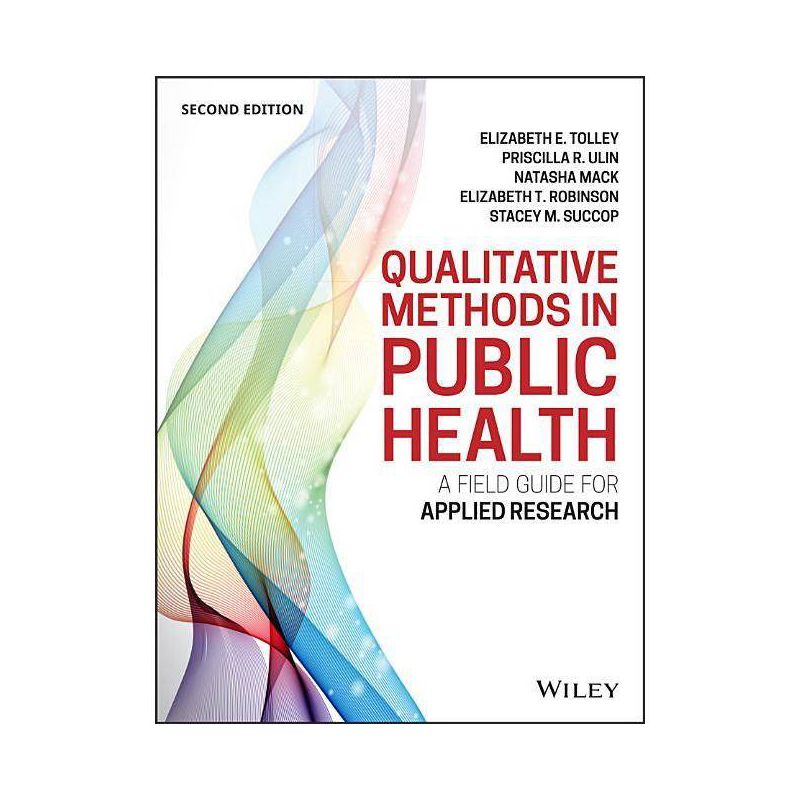Sponsored
Qualitative Methods in Public Health - (Jossey-Bass Public Health) 2nd Edition (Paperback)
Sponsored
About this item
Highlights
- Qualitative Methods in Public Health: A Field Guide for Applied Research, 2nd Edition provides a practical orientation to conducting effective qualitative research in the public health sphere.
- About the Author: ELIZABETH E. TOLLEY is a senior scientist and Director of the Social and Behavioral Health Sciences division of FHI 360.
- 480 Pages
- Medical, Public Health
- Series Name: Jossey-Bass Public Health
Description
About the Book
"A real-world guide to conducting rigorous qualitative research Qualitative Methods in Public Health: A Field Guide for Applied Research provides a practical orientation to conducting effective qualitative research in the public health sphere. With thorough examination and simple explanations, this book guides you through the logic and workflow of qualitative approaches, with step-by-step guidance on every phase of the research. You'll learn how to identify and make use of theoretical frameworks to guide your study, and then design the study to answer specific questions and achieve the research goals. Data collection, analysis, and interpretation are given close attention as the backbone of a successful study, and expert insight on reporting and dissemination helps you get your work noticed. This second edition features new examples from global health, including case studies specifically illustrating study design, web and mobile technologies, mixed methods, and new innovations in information dissemination. Pedagogical tools have been added to help enhance your understanding of research design and implementation, and extensive appendices show you how these concepts work in practice. Qualitative research is a powerful tool for public health, but it's very easy to get it wrong. Careful study design and data management are critical, and it's important to resist drawing conclusions that the data cannot support. This book shows you how to conduct high-quality qualitative research that stands up to review. Design robust qualitative studies and collect the appropriate data Translate your data into words without sacrificing accuracy Merge qualitative and quantitative data to tell the whole story Master the logistics of consent, interviews, focus groups, and more Effective public health programs require insight into the different contexts that affect behavior. A thorough understanding--and appropriate application--of qualitative research strategies is the difference between relevant and credible conclusions and pseudoscience. Qualitative Methods in Public Health shows you how to get it right every step of the way"--Book Synopsis
Qualitative Methods in Public Health: A Field Guide for Applied Research, 2nd Edition provides a practical orientation to conducting effective qualitative research in the public health sphere. With thorough examination and simple explanations, this book guides you through the logic and workflow of qualitative approaches, with step-by-step guidance on every phase of the research. Students learn how to identify and make use of theoretical frameworks to guide your study, design the study to answer specific questions, and achieve their research goals.
Data collection, analysis, and interpretation are given close attention as the backbone of a successful study, and expert insight on reporting and dissemination helps you get your work noticed. This second edition features new examples from global health, including case studies specifically illustrating study design, web and mobile technologies, mixed methods, and new innovations in information dissemination. Pedagogical tools have been added to help enhance your understanding of research design and implementation, and extensive appendices show you how these concepts work in practice.
Qualitative research is a powerful tool for public health, but it's very easy to get it wrong. Careful study design and data management are critical, and it's important to resist drawing conclusions that the data cannot support. This book shows you how to conduct high-quality qualitative research that stands up to review.
From the Back Cover
THE NEW EDITION OF THE REAL-WORLD GUIDE TO CONDUCTING RIGOROUS QUALITATIVE RESEARCH
The revised and updated second edition of Qualitative Methods in Public Health: A Field Guide for Applied Research offers faculty, practitioners, and students a comprehensive handbook to conducting effective qualitative research in the public health arena.
The text contains thorough reviews and accessible explanations of the rationale and workflow of the qualitative approaches presented. Step-by-step, the authors give clear-cut instructions on every phase of the research process including: focusing on a theory, study design, data collection, analysis, interpretation, writing, and dissemination.
New to the second edition is a wealth of examples and applications from global health experts, cases specifically illustrating study design, web and mobile technologies, ideas for the mixing of methods, and recent innovations in dissemination. In addition, each chapter offers pedagogical tools to enrich teaching and learning.
Qualitative Methods in Public Health, Second Edition presents:
- Guidelines for creating powerful qualitative studies and collecting the appropriate data
- Examples that show how to accurately transform data into words
- Lessons for merging qualitative and quantitative data that tell the whole story
- Ideas for mastering the logistics of consent, interviews, focus groups, and more
Filled with practical strategies and approaches for employing qualitative research, the second edition of Qualitative Methods in Public Health is a must-have resource.
About the Author
ELIZABETH E. TOLLEY is a senior scientist and Director of the Social and Behavioral Health Sciences division of FHI 360.
PRISCILLA R. ULIN is retired from Family Health International (now FHI 360), where she was senior research scientist in the Social and Behavioral Sciences division.
NATASHA MACK is a researcher in the Social and Behavioral Health Sciences division at FHI 360.
ELIZABETH T. ROBINSON is the senior advisor for communications at the University of North Carolina at Chapel Hill's MEASURE Evaluation project.
STACEY M. SUCCOP is a research associate in the Scientific Affairs department at FHI 360.
Additional product information and recommendations
Sponsored
